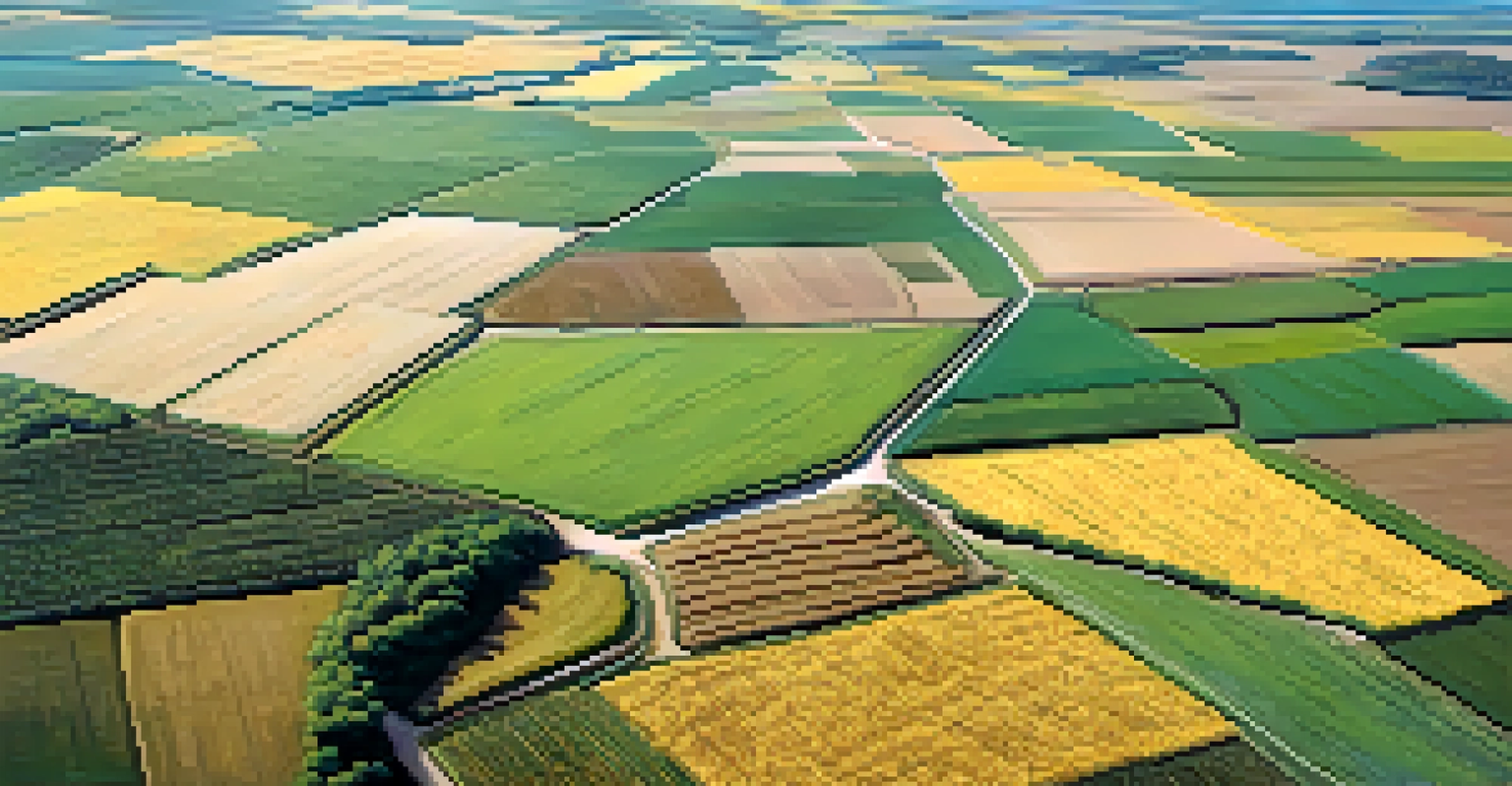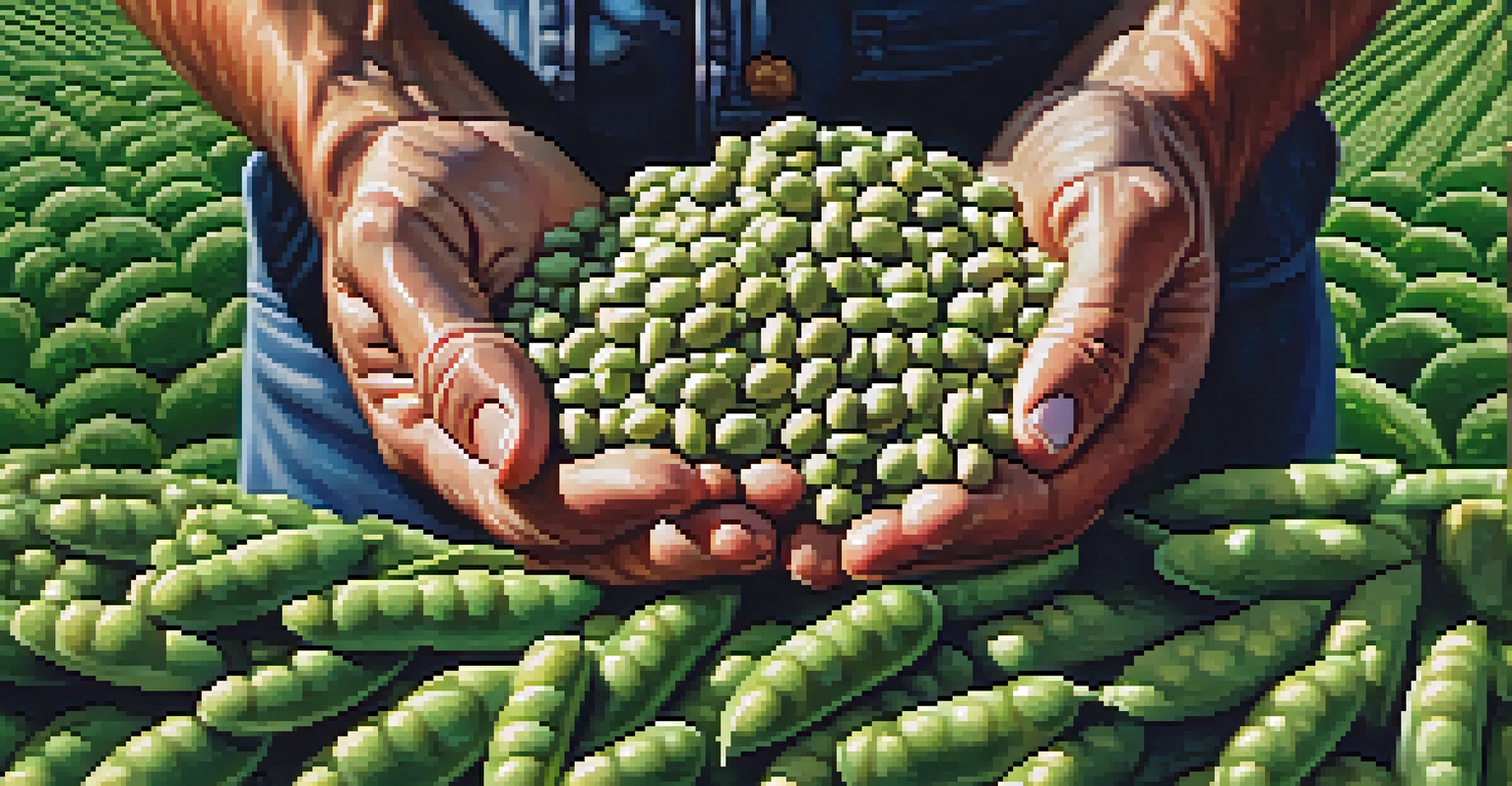Missouri's Agricultural Exports: Boosting Local Economy

Understanding Missouri's Role in Agriculture
Missouri is often referred to as the 'Show-Me State,' but it could easily be called the 'Show-Me Agriculture State.' Agriculture plays a fundamental role in Missouri's economy, with the state ranking among the top producers of various crops and livestock. Corn, soybeans, and cattle are just a few of the key products that contribute to the state's agricultural identity.
Agriculture is the most healthful, most useful and most noble employment of man.
In addition to these staples, Missouri is also known for its production of fruits, vegetables, and specialty crops. This diverse agricultural landscape not only supports local farmers but also feeds millions across the nation and beyond. When we think about Missouri's economy, it's essential to recognize how intertwined agriculture is with local livelihoods and the state's overall financial health.
As we dive deeper into the impact of agricultural exports, it becomes clear that this sector is not just about food production; it’s also a significant driver of economic activity, job creation, and community development across the state.
Key Agricultural Exports from Missouri
Missouri's agricultural exports encompass a wide range of products, with soybeans being the star of the show. The state consistently ranks in the top five for soybean production in the U.S., exporting millions of bushels each year to countries like China and Mexico. This demand not only boosts revenue for farmers but also supports jobs in transportation, processing, and distribution.

In addition to soybeans, Missouri is a leading exporter of corn, livestock, and dairy products. These exports generate substantial income for the state and help maintain its status as a vital player in the global agricultural market. For example, Missouri's beef exports are particularly noteworthy, with high-quality meat being sought after in international markets.
Missouri's Agricultural Economy Thrives
Agriculture is a key driver of Missouri's economy, significantly contributing to local livelihoods and financial health.
Understanding which products are exported and where they go helps illustrate the economic significance of these commodities. As Missouri continues to grow its agricultural exports, the state's economy stands to benefit even more.
Economic Impact of Agricultural Exports
Agricultural exports have a profound impact on Missouri's economy, contributing billions of dollars each year. This influx of revenue not only supports farmers but also stimulates related industries like manufacturing, transportation, and retail. The ripple effect of agricultural exports creates jobs and boosts local economies, ensuring that communities thrive.
The farmer has to be an optimist or he wouldn’t still be a farmer.
For instance, the export of soybeans alone generates substantial income for rural areas, where agriculture is often the backbone of the economy. This income helps fund local schools, infrastructure projects, and health services, which in turn enhances the quality of life for residents.
Moreover, the growth of agricultural exports can lead to increased investment in technology and innovation within the sector. As Missouri farmers adopt new practices and technologies to enhance productivity, the entire state benefits from a more robust agricultural economy.
Challenges Facing Missouri's Agricultural Sector
Despite its strengths, Missouri's agricultural sector faces several challenges that can impact exports. Climate change, for example, poses risks to crop yields and livestock production, making it imperative for farmers to adapt to changing weather patterns. These changes can affect not just local supply but also the state's ability to meet international demand.
Trade policies and tariffs are another significant concern. Political decisions can directly influence the cost and feasibility of exporting goods, sometimes putting Missouri farmers at a disadvantage compared to their counterparts in other states or countries. This unpredictability can create uncertainty for producers and impact their long-term planning.
Exports Propel Economic Growth
Missouri's agricultural exports, particularly soybeans and livestock, generate billions in revenue and create jobs across the state.
Addressing these challenges requires collaboration among farmers, policymakers, and researchers to develop sustainable practices and strategies. By working together, Missouri can continue to bolster its agricultural exports and strengthen its economy.
The Role of Technology in Agriculture
Technology is playing an increasingly crucial role in enhancing Missouri's agricultural exports. From advanced irrigation systems to precision farming techniques, technology helps farmers maximize their yields while minimizing environmental impact. This not only boosts productivity but also makes Missouri's agricultural products more competitive in the global market.
For example, the use of data analytics allows farmers to make informed decisions about planting and harvesting, optimizing their resources for better outcomes. Drones and satellite imagery can provide valuable insights into crop health, enabling timely interventions that can save entire harvests.
As technology continues to evolve, it opens up new opportunities for Missouri's agricultural sector. Embracing innovation will be key to maintaining and expanding the state's export capabilities, ensuring that Missouri remains a leader in agricultural production.
Sustainable Practices in Missouri Agriculture
Sustainability has become a buzzword in agriculture, and Missouri is no exception. Farmers across the state are increasingly adopting sustainable practices that not only benefit the environment but also enhance the quality of their products. These practices can include crop rotation, cover cropping, and reduced pesticide use, all of which contribute to healthier soil and ecosystems.
Sustainable agriculture also appeals to consumers, who are more inclined to support products that are produced responsibly. As a result, Missouri's farmers are finding that adopting eco-friendly practices can open up new markets and boost demand for their exports.
Sustainability Shapes Future Practices
Adopting sustainable agricultural practices helps Missouri farmers enhance product quality while catering to environmentally-conscious consumers.
By prioritizing sustainability, Missouri can position itself as a leader in the agricultural export market, catering to a growing base of environmentally-conscious consumers both domestically and internationally.
Future Outlook for Missouri's Agricultural Exports
The future of Missouri's agricultural exports looks promising, with opportunities for growth in both traditional and emerging markets. As global populations continue to rise, the demand for food and agricultural products is expected to increase significantly. This trend presents a unique opportunity for Missouri to expand its export footprint.
Moreover, as consumers become more interested in organic and locally-sourced products, Missouri's farmers can tap into these niche markets. By diversifying their offerings and responding to consumer trends, Missouri can enhance its competitiveness in the global agricultural landscape.

In conclusion, with a focus on innovation, sustainability, and collaboration, Missouri's agricultural exports can continue to play a vital role in strengthening the local economy for years to come.